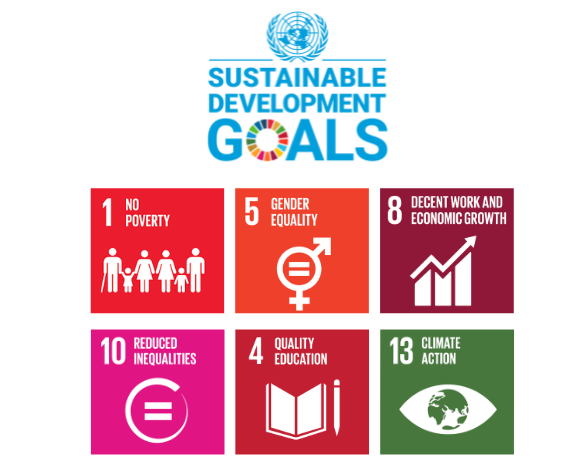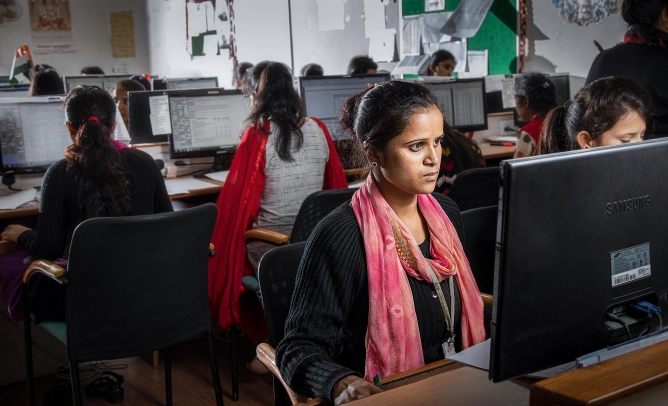SDG 1 – No Poverty
As a pure-play impact sourcing provider, B2R is committed to creating livelihood opportunities in an impoverished region of the Himalayan foothills. It has brought professional, knowledge based work within walking distance of 900+ previously unemployed youth in the region. By offering an alternative to forced migration in search of work, employees are saved the trade-off between staying in their communities and availing career opportunities. Since 2009, approximately US$ 3.8 million (INR 26.3 Crore) has been paid as direct wages, and US$ 908,000 (INR 6.1 Crore) have been disbursed into the local economy by B2R to local vendors. In a region where average monthly earning are in the range of US$ 20 (INR 1500), this initiative has gone a long way in reducing poverty in over 135 villages where B2R has operated.
SDG 4 – Quality Education
Lifelong learning opportunities define B2R’s people policies. Having started with a rural workforce that had barely heard of computers, the transformation into a skilled team that delivers world class domain-specific services has been a long journey of growth and quality training for the employees.
Identifying and nurturing local leadership forms a core aspect of B2R’s business strategy. To this end, potential leaders are imparted the necessary skills through customized learning modules.
Young employees desirous of continuing their formal education are also encouraged; individual team members’ tasks are reorganized in line with university examination schedules to maintain client delivery schedules undisturbed.
SDG 5 – Gender Equality
B2R takes pride in having ensured that women make up at least half of all teams at the rural centres. This was no mean feat, given the conservative, patriarchal milieu they come from. Today, women have successfully negotiated their social and financial independence, have delayed the average marriageable age from 16-17 to 23-24, and enjoy a dignity and respect not accorded to the mostly-illiterate womenfolk in their earlier generations.
SDG 8 – Decent Work & Economic Growth.
Unlike the informal economy that accounts for 88% of India’s workforce, B2R employees are in formal, legally-mandated employment terms. This ensures them a minimum wage, benefits like healthcare, social security, paid leave and gratuity, in addition to growth opportunities through quality training modules; and an unmatched pride in being part of the global workforce they hitherto knew nothing about.
B2R adopts a business strategy that enables them to assure long term employment to the workforce, absorbing the unpredictability of client needs and pipeline projects that may need time to convert to signed projects. This enables employees to achieve their life goals with confidence and plan ahead for themselves and their families.
SDG 10 – Reduced Inequality
In keeping with national & international conventions, B2R adopts aEqual Pay for Equal Work practice, ensuring women are paid equally as men. Taking this philosophy forward, B2R makes the additional effort to counsel individuals & families so that women are encouraged to join the workforce. A hiring process engineered to improve gender equity has resulted in at least half the B2R workforce comprising of women. B2R women staff are seen as valuable economic contributors by their families, earning them dignity and respect in the conservative, patriarchal societies they come from. This has also led to an upward shift in marriageable age from 16-18 to mid-20s.
SDG 13 – Climate Action
Given the ecologically fragile mountainous region where B2R operates, it was imperative that the socially conscious company incorporate ecologically sensitive policies as well. It has ensured its carbon footprint is less than a third of comparable urban centres for the same services, bringing ‘clean’ jobs to the mountains. Investing in low-power consumption desktops (taking only 80W of power instead of the usual 250-300W), no use of air conditioners in the centres located in high altitude villages; employees walking to work at the centres set up close to their villages instead of using transport; recycling paper at the centres, planting trees, supporting environment awareness campaigns and waste management initiatives; all these contribute to B2R having a significantly lower carbon footprint that its urban peers.



